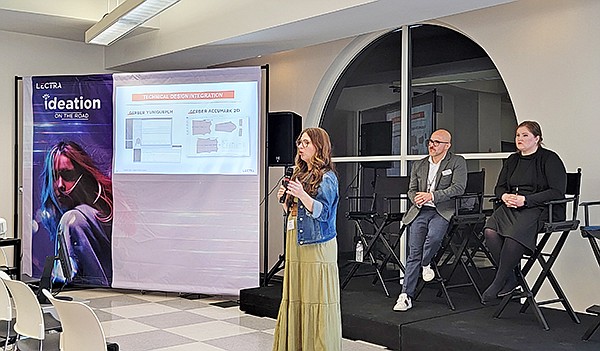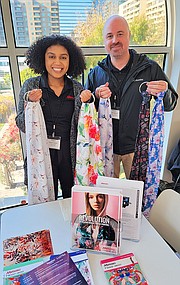TECHNOLOGY
Ideation Conference Focuses on Sustainability, Turnaround, Less Waste
Fashion executives, technology leaders and innovators gathered at the Fashion Institute of Design & Merchandising in downtown Los Angeles Dec. 8 for the Ideation on the Road 2022 conference, the industry’s premier fashion-technology event for like-minded professionals, trailblazers and a team of technology experts from the Hartford, Conn.–based Lectra, Americas. Making sustainability fashionable was the main theme of the daylong event.
Opening remarks were made by Lenny Marano, president of Lectra, Americas,who said it all goes back to the cloud and industry 4.0 solutions. “By leveraging data integration and analytics, the power of cloud computing is going to bring a whole new value to the apparel value stream that hasn’t been there before,” he said.
A mix of industry professionals, designers and manufacturers attended the event, which included an Interactive Studio: Sponsors Showcase, Fashion Showcase and series of panel discussions around “Insight & Challenges in the Fashion Industry,” “Transforming the Fashion Industry With On-Demand Production,” “Optimizing Your Cutting Room With Data” and Lectra’s new and upcoming technology including fashion on-demand solutions, cloud-based nesting, PLM platforms, 3D and competitive benchmarking software for tracking almost anything you can think of.
Marano shared his excitement about Lectra’s recent acquisition of Hong Kong–based TextileGenesis, asoftware as a service–based traceability platform for the fashion industry. “Being able to confirm with certainty where the fiber and product are being sourced and where the labor is coming from is becoming more important in our socially conscious environment, and the technology that TextileGenesis has developed really provides us with that visibility,” said Marano.
The overall goal of the event was to help transform the fashion industry by offering companies the ability to be more sustainable by reducing material usage and waste; improving yields; saving time from design to the final product; and utilizing technology, analytics and data-driven programs to help brands lower costs, limit the amount of product going to the landfill and getting a leg up on the competition.
“Technology enables us to track all our garments better through the whole life cycle of them to minimize waste and boost an overall sense of social equity among the people we sell to and the communities we are part of,” said Norman Ramirez, director of information systems and technology at the Huntington Park, Calif.–based Citizens of Humanity LLC.
“Sustainability is a core challenge to the industry,” said Don Whaley, VP sales and marketing Americas, at the Rosh Haayin, Israel–based Kornit Digital. Kornit develops and sells large digital-printing solutions, workflow ink and the actual print technology. “It’s all about sustainability and printing what you need when you need it and where you need it,” said Whaley.
“The possibilities are exciting; if we lean into the future, we can do great stuff working together,” said keynote speaker Bill McRaith, former supply-chain executive most recently at the New York–based PVH Corp.,who added, “My main focus now is reshoring in a very specific way to bring 10 percent of the apparel business back on shore to give us more-predictable data to place better orders offshore and reduce the waste that we create through these big supply chains currently being used. Everything is possible if people lean into the pain of change,” said McRaith, who is currently creating mass regeneration zones in West Africa as a pilot to show the world what could be done at scale on recycling in the apparel industry.
“Get in while you can,” said Gabriel Crumpler, applications specialist at Suwanee, Ga.–based Mimaki USA,who added, “This is where the future is going. A lot of end users are wanting to create products that are personalized and customized for their customers, and we really see Mimaki being at the forefront of the printing industry.”
“Having a digital on-demand process to dye exactly as much as you need eliminates a lot of the waste and time to market,” said Senior Marketing Manager Adi Mandel of the Petah Tikva, Israel–based Twine, which has developed a one-of-a-kind system that digitally dyes threads and yarns for sewing, knitting and embroidery. “It’s important because the whole dyeing process is done without using any water at all,” she said, adding, “You can walk down the hall, press a button and get the thread in any color that you need in hours.”
“We’re one of the only micro factories in the U.S. that can do on-demand print and cut/pack/ship showing several brands using the technology,” said Angela Johnson, strategy and innovation, at the Tempe, Ariz.–based FABRIC, Fashion and Business Resource Innovation Center, a nonprofit fashion incubator who said it uses all the Gerber, Lectratechnology and the Kornit printer. “When you can actually develop something digitally, virtually stitch it up, see what it’s going to look like, perfect the fit, embed an engineered print all before putting your scissors to your cloth and paying for that sample, it just saved you multiple samples and the cost that goes into that,” said Johnson.























